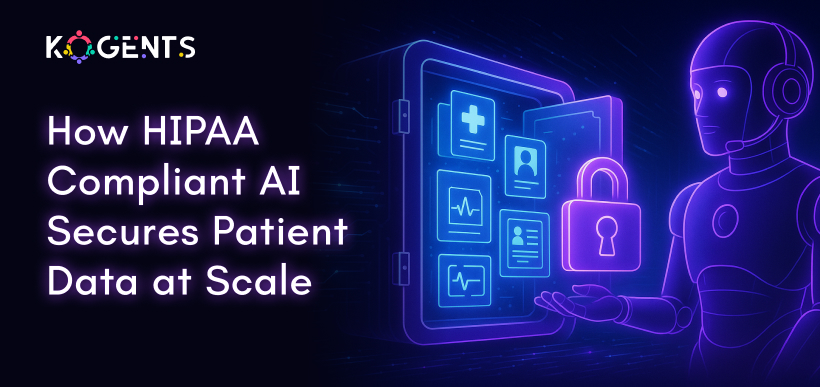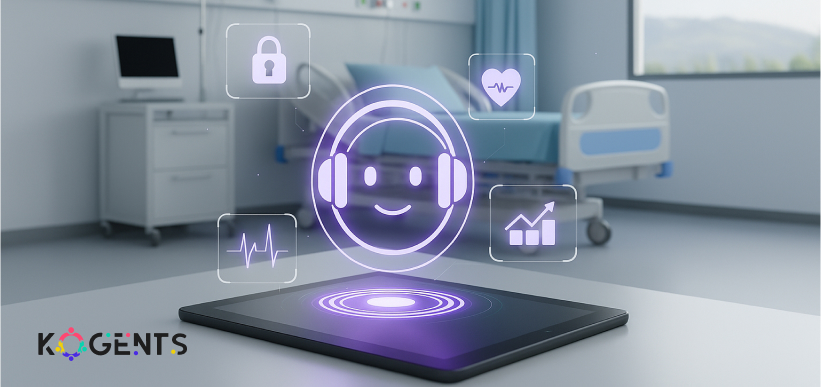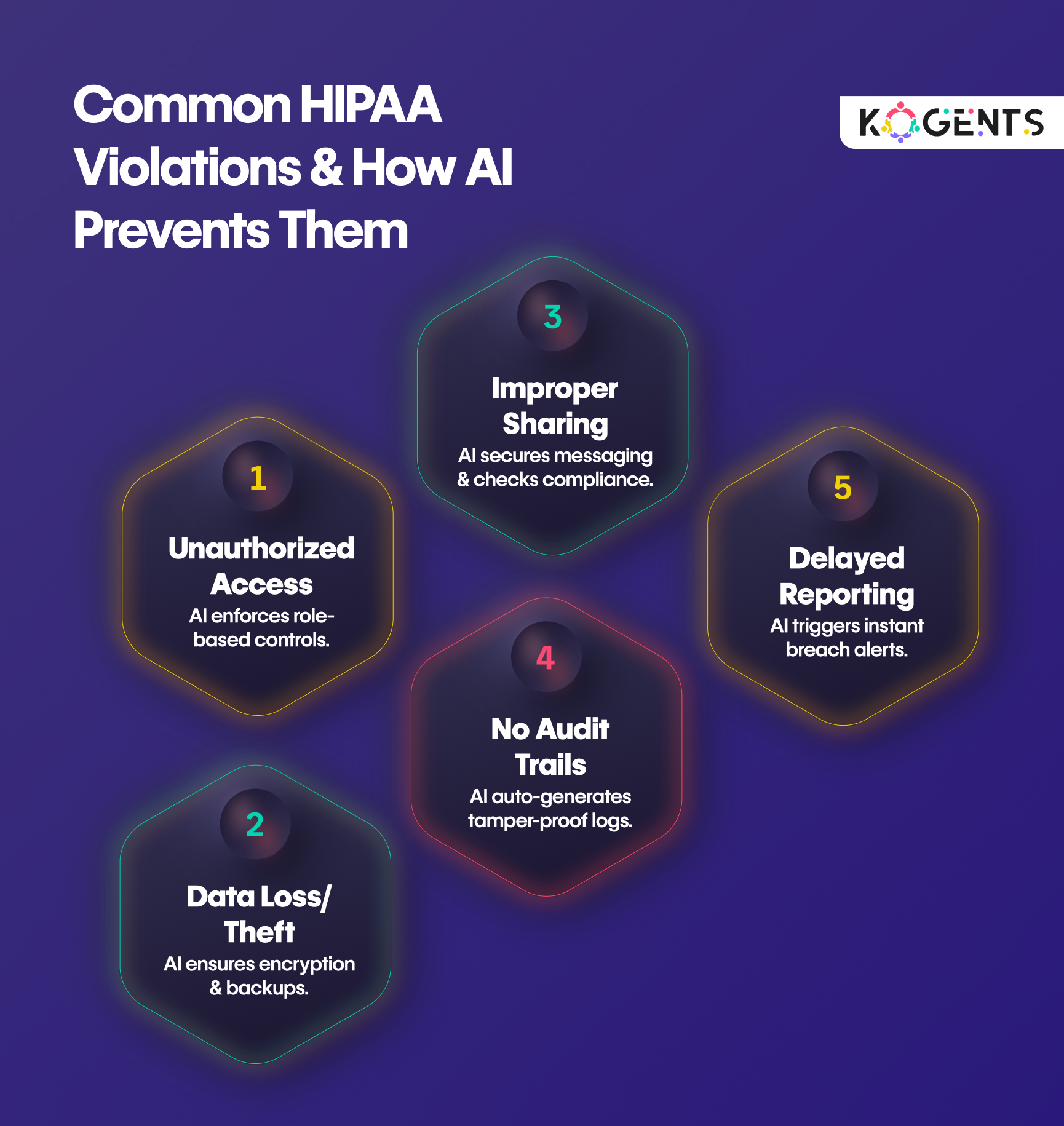How HIPAA Compliant AI Secures Patient Data at Scale

Summary:
The healthcare environment, protecting patient data at scale has never been more critical than this. With electronic health records (EHRs), telemedicine platforms, and cloud-based compliance services becoming standard, the risk of data breaches grows every year.
Cyberattacks on hospitals and clinics are not just disruptive; they can compromise lives.
This is where HIPAA-compliant AI emerges as a game-changer. Unlike traditional automation tools, HIPAA-compliant AI agents combine secure workflows, intelligent decision-making, and agentic AI principles to streamline operations while safeguarding patient privacy.
In an age of automation and data-driven healthcare, the HIPAA Compliant AI Agent is not just a tool, it’s a trusted partner for clinicians, hospitals, insurers, and patients alike.
Key Takeaways
- How HIPAA-compliant AI agents secure patient data with built-in safeguards.
- The role of automation and personalization in improving healthcare workflows.
- Real-world examples of privacy-preserving, large-scale data collaboration.
- Key benefits for efficiency, compliance, and patient engagement.
- Future trends in predictive care and global compliance readiness.
What is a HIPAA Compliant AI Agent?
Defining AI Agents in Healthcare
An AI agent is a goal-driven, context-aware system capable of perceiving inputs, reasoning through data, and taking appropriate actions. In healthcare, this could mean answering patient queries, scheduling appointments, or generating compliance-ready reports.
HIPAA Compliance: Core Requirements
HIPAA (Health Insurance Portability and Accountability Act) mandates strict safeguards for patient health information (PHI). Any AI agent must:
- Encrypt data at rest and in transit
- Restrict unauthorized access
- Maintain audit trails
- Provide breach notifications when required
The Role of Agentic AI Principles
Agentic AI brings autonomy and adaptability to healthcare workflows. A HIPAA compliant AI agent is not just reactive, it can anticipate needs, personalize responses, and execute tasks securely across multiple systems.
Know How HIPAA Compliant AI Agent Operates?
A HIPAA Compliant AI Agent is more than just a chatbot, it’s an intelligent digital co-worker that securely processes, interprets, and acts on sensitive health data.
Let’s break down the workflow.
Workflow: Input → Reasoning → Action → Feedback
- Input
- Patients submit queries (via text, portal, or voice).
- Providers request reports, schedule updates, or compliance checks.
- External systems feed insurance claims or lab data.
- Reasoning
- The AI applies contextual reasoning: cross-checking HIPAA rules, clinical guidelines, and organizational workflows
- Example: A patient requests lab results → the AI ensures they are released only after physician sign-off.
- Action
- Executes tasks such as scheduling, secure messaging, updating EHRs, or generating reports.
- Applies least-privilege access principles, only touching data needed for the task.
- Feedback
- Sends real-time confirmations.
- Logs every action into immutable audit trails for compliance officers.
- Provides analytics dashboards to leadership.
This cycle repeats continuously, with the AI agent learning from prior interactions to improve performance while staying within HIPAA-compliant artificial intelligence chatbots.
Real-World Example: VaultDB in the Chicago Area Patient-Centered Outcomes Research Network
VaultDB is a framework built to allow secure, federated querying over electronic health records (EHRs) from multiple institutions, without needing to move or centralize raw patient data.
Scale:
- Involves multiple health systems (clinics and hospitals) in the Chicago metro area.
- Represents data from nearly 13 million patients across hundreds of clinics and hospitals.
How it secures data & ensures HIPAA-compliance at scale:
- Secure Multi-Party Computation (MPC): The system allows SQL queries or analytical operations to run in a way that only the result of the query is revealed; raw patient data stays within the original institution and is never aggregated or transferred. This helps maintain confidentiality and limits exposure.
- Federated architecture: Each health system keeps its own data; the framework allows collaborative analysis without sharing the underlying protected health information (PHI) across organizational boundaries. This decentralization reduces risk of large-scale data breaches.
- Auditability & regulatory alignment: Because data doesn’t move, and because access is tightly controlled, these systems can more easily demonstrate compliance with HIPAA rules (Privacy Rule, Security Rule) regarding access, use, and disclosure. It also simplifies oversight and auditing since the computing happens locally under each entity’s governance.
- Scalability: The model shows that even with large patient bases (millions of records), one can perform meaningful analytics and research across institutions while still protecting privacy. VaultDB’s deployment across multiple institutions demonstrated acceptable performance and scalability in queries and computations.

Core Features of a HIPAA Compliant AI Agent
1. Automation Across Healthcare Workflows
- Appointment scheduling, lab result follow-ups, insurance verification.
- Auto-generation of compliance documentation for audits.
- Secure messaging that filters out unverified access attempts.
Automation powered by a healthcare AI agent means a nurse who once spent 4 hours/day on reminders can now devote that time to patient care.
2. Personalization and Context-Aware Responses
Unlike static chatbots, HIPAA AI agents pull from a patient’s medical history, care plan, and consent settings.
- Example: Instead of sending a generic reminder, the AI personalizes:
“Maria, remember to take your blood pressure medication 30 minutes before your appointment tomorrow at 10 AM.”
3. Multi-Tasking Across Departments
A single HIPAA AI agent can simultaneously:
- Manage billing disputes with insurance.
- Handle real-time secure patient chats.
- Generate compliance-ready reports for administrators.
Key Note: This multi-threading capability is especially valuable in busy hospital systems with thousands of concurrent interactions.
4. Analytics, Reporting, and Audit Trails
Every interaction is logged with who, what, when, and why.
- Generates compliance dashboards for HIPAA audits.
- Tracks patient engagement metrics (response rates, follow-up completion).
- Identifies operational bottlenecks (e.g., frequent scheduling conflicts).
Need For Insights? They help hospitals optimize both compliance and patient care.
Benefits of Using a HIPAA Compliant AI Agent
Efficiency and Time Savings
It is observed that the healthcare staff spend over 20% of their time on administrative tasks. AI agents cut this significantly by automating scheduling, claims, and compliance reports.
24/7 Availability
- Patients expect Amazon-level responsiveness.
- With AI agents, a hospital doesn’t need to hire overnight staff just to handle routine questions.
- The AI is always on, always secure.
Error Reduction and Compliance Assurance
Manual processes are error-prone, missed signatures, misfiled forms, outdated logs. AI agents enforce compliance by design, ensuring no step is skipped.
Enhanced Patient Engagement and Trust
A patient who receives quick, personalized, and secure responses is more likely to trust their provider and follow treatment plans. This translates into higher satisfaction scores and better health outcomes.
Challenges and Limitations
Integration and API Restrictions
Some EHRs remain closed ecosystems, making seamless integration difficult. Workarounds often require custom connectors or middleware solutions.
Data Privacy and Security Risks
Even compliant systems face risks like phishing attacks on staff or insider misuse. AI agents mitigate risks but cannot eliminate them. Hence it pertains to secure HIPAA-compliant AI data storage and protect HIPAA AI patient privacy solutions.
Vendor Lock-In
Many AI providers bundle compliance features into proprietary systems. Hospitals risk becoming overly dependent on a single vendor.
Adoption Barriers
- Cost: Smaller clinics may struggle with subscription fees.
- Training: Staff must learn to trust and work alongside AI.
- Cultural resistance: Some providers fear AI will “replace” human judgment.
Tip For You: Addressing these barriers requires a balanced approach of education, governance, and phased adoption.

HIPAA Compliant AI Agents Brings In Future?
The future is not about replacing humans, it’s about augmenting care with predictive, proactive intelligence.
Predictive and Proactive Patient Care
Agents will move from reactive to predictive:
- Flagging patients at risk of readmission.
- Recommending early interventions.
- Sending medication adherence nudges before issues arise.
Federated Learning and Privacy-Preserving AI
New AI models allow hospitals to train on shared insights without exchanging raw patient data, enhancing security across networks.
Multi-Agent Healthcare Ecosystems
Imagine a hospital AI agent coordinating with pharmacy, insurer, and patient home-monitoring agents, all securely sharing context to deliver seamless care.
Cross-Border Compliance
As telemedicine expands globally, HIPAA agents will evolve to comply with GDPR in Europe, PIPEDA in Canada, and APPI in Japan, creating truly global, secure clinical AI.
Use Cases for Individuals and Businesses
Solopreneurs: Independent Clinicians and Outreach
Independent practitioners use HIPAA AI agents to:
- Manage reminders and follow-ups
- Handle secure patient messaging
- Streamline insurance paperwork
Businesses: Hospitals, Insurance, and Customer Support
Hospitals deploy HIPAA AI agents to:
- Handle 24/7 patient queries
- Automate pre-authorization requests
- Maintain compliance reporting
Teams: Care Coordination and Internal Communication
AI agents act as digital assistants for care teams, coordinating schedules, tasks, and monitoring.
HIPAA Compliant AI Agent vs. Other Agents
Comparison with Slack Bots and Consumer Agents
Slack bots or marketing AI chatbots are not built for HIPAA compliance. They lack medical-grade security, encryption, and regulatory audit features.
Unique Advantages in Healthcare Compliance
HIPAA AI agents are designed to handle PHI safely, offering:
- Encrypted communications
- Integrated compliance logs
- Secure interoperability
HIPAA AI Agent vs. General Agents
| Feature | HIPAA AI Agent | General AI Agent |
| Data Security | HIPAA-level encryption | Basic encryption |
| Compliance Logs | Detailed & auditable | Rarely supported |
| Healthcare Integrations | EHR, EMR, insurance APIs | Limited |
| Personalization | Context-aware & compliant | Generic responses |
| Adoption Readiness | Healthcare optimized | General-purpose |
Case Study Spotlight
A regional hospital integrated a HIPAA AI agent into its scheduling and compliance system. Within six months:
- Manual compliance reporting time dropped by 40%
- Patient satisfaction scores improved by 18%
- Staff reported a 25% reduction in administrative burden
Expert Insights“The biggest advantage of HIPAA AI agents is not just efficiency—it’s trust. Patients know their data is safe, and providers know compliance is baked into every action.” — Dr. Emily Johnson, Healthcare Compliance Officer |
Before You Leave!
Healthcare is at a breaking point. Cyberattacks are escalating, and healthcare cybersecurity patient trust is fragile, and clinical teams are stretched beyond capacity.
The path forward demands more than incremental fixes, it requires HIPAA-compliant AI agents that can deliver automation, personalization, and compliance at scale.
These agents safeguard PHI with military-grade encryption while freeing valuable staff time for direct patient care.
They ensure compliance through detailed logs and real-time reporting, and they strengthen trust by enabling secure, responsive interactions with patients.
For hospitals, insurers, and independent clinicians, the adoption of HIPAA-compliant AI is no longer just an innovation, it has become a necessity for delivering sustainable, secure, and patient-centered healthcare.
To explore HIPAA-compliant AI solutions and case studies, visit Kogents AI today and drop an email at info@portal.kogents.ai or give us a call at (267) 248-9454.
FAQs
Is patient data really secure with AI?
Yes, HIPAA AI agents use encryption, access control, and audit trails to protect PHI.
Can HIPAA AI integrate with any EHR system?
Most modern EHRs support API integrations, but some legacy systems may require custom connectors.
How does AI maintain compliance logs?
Agents generate time-stamped activity logs that can be reviewed during audits.
What are the costs for small practices?
Pricing varies, but independent clinicians often benefit from affordable, subscription-based models.
How does personalization not violate privacy?
HIPAA AI uses patient consent and secure data handling to personalize without overstepping.
Will AI replace human staff in healthcare?
No. AI augments staff by reducing administrative tasks, not replacing clinical expertise.
What is HIPAA-compliant AI?
HIPAA-compliant AI refers to artificial intelligence systems designed for healthcare that meet all requirements of the Health Insurance Portability and Accountability Act. These solutions ensure the protection of patient data (PHI) through encryption, access controls, and audit trails.
How does AI comply with HIPAA regulations?
AI complies with HIPAA by following strict safeguards such as secure data storage, role-based access, real-time monitoring, and tamper-proof logging. In other words, AI complies with HIPAA regulations by ensuring PHI is encrypted, tracked, and only accessible to authorized users.
What are the best HIPAA-compliant AI tools in 2025
The best HIPAA-compliant AI tools 2025 include cloud-based platforms like Google Cloud Healthcare API, Microsoft Azure for Healthcare, and AWS HIPAA-compliant AI services, along with specialized vendors offering AI chatbots and transcription tools.
Can I use HIPAA-compliant AI for telehealth platforms?
Yes. Many providers now integrate HIPAA-compliant AI for telehealth platforms, enabling secure video consultations, automated transcription, and encrypted data storage while maintaining regulatory compliance.
What is the cost of HIPAA-compliant AI solutions?
The cost of HIPAA-compliant AI solutions varies depending on scale and functionality. Basic chatbots or transcription tools may cost a few hundred dollars per month, while enterprise-level hospital deployments with advanced features can run into six or seven figures annually.

Kogents AI builds intelligent agents for healthcare, education, and enterprises, delivering secure, scalable solutions that streamline workflows and boost efficiency.